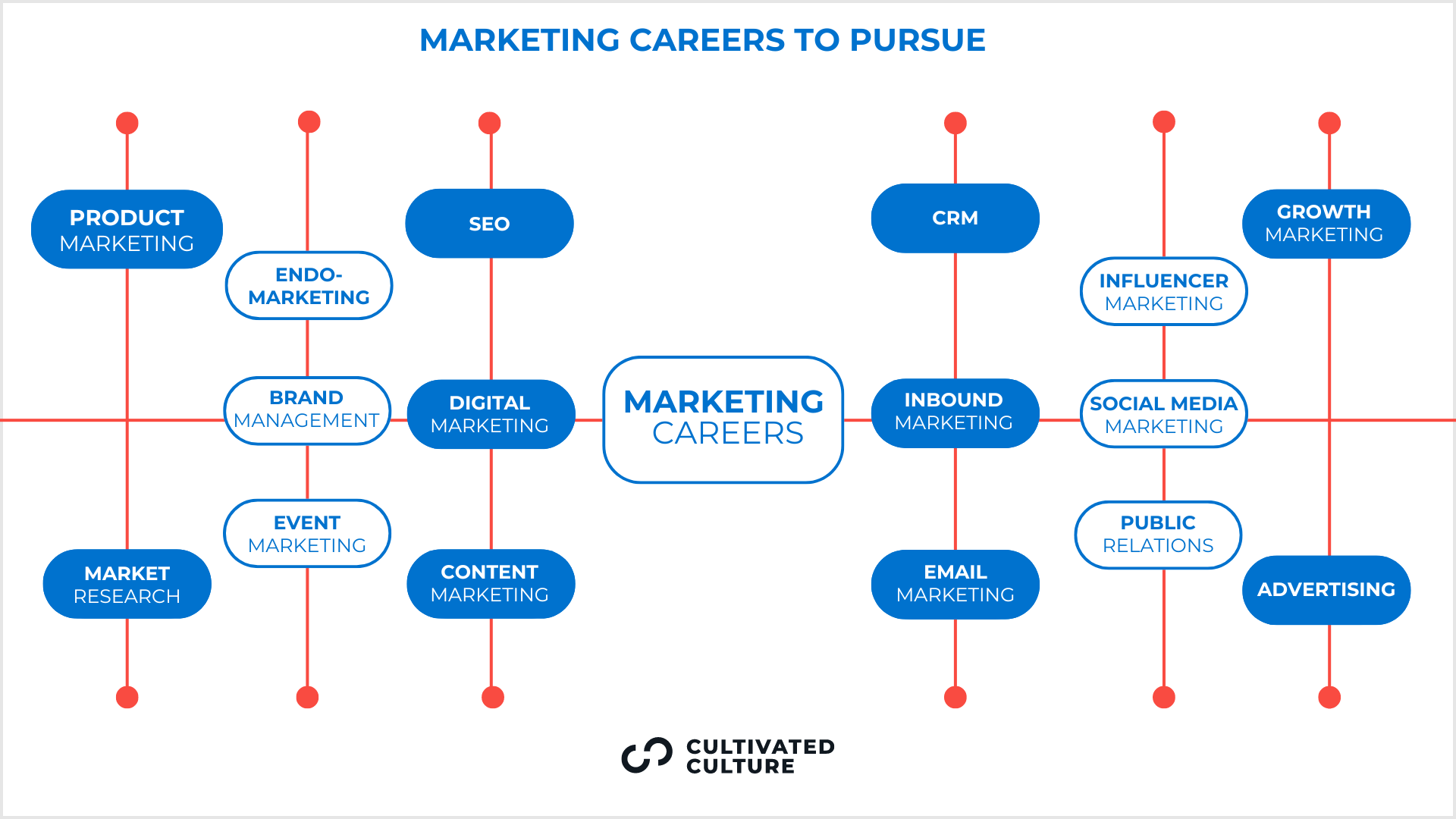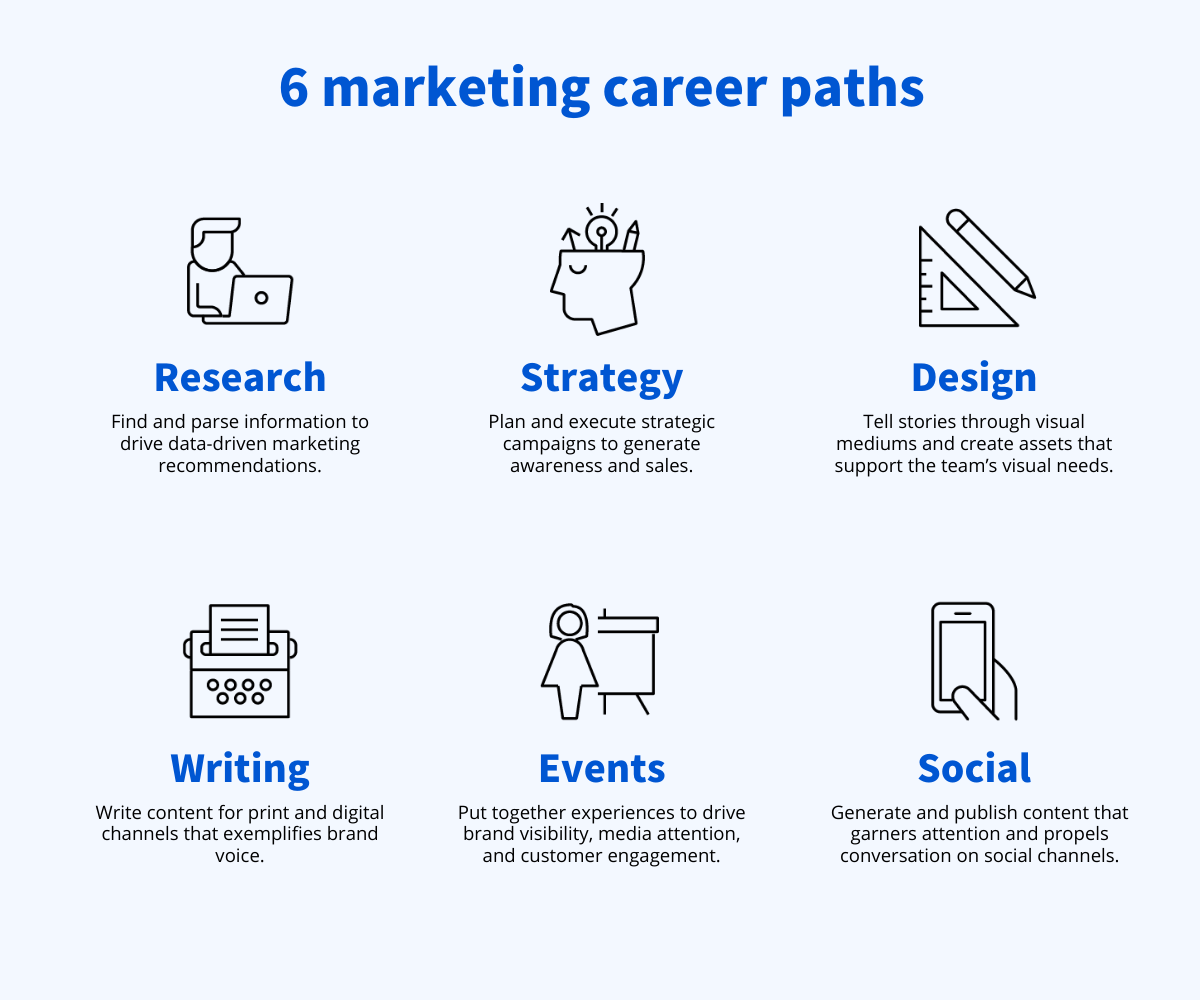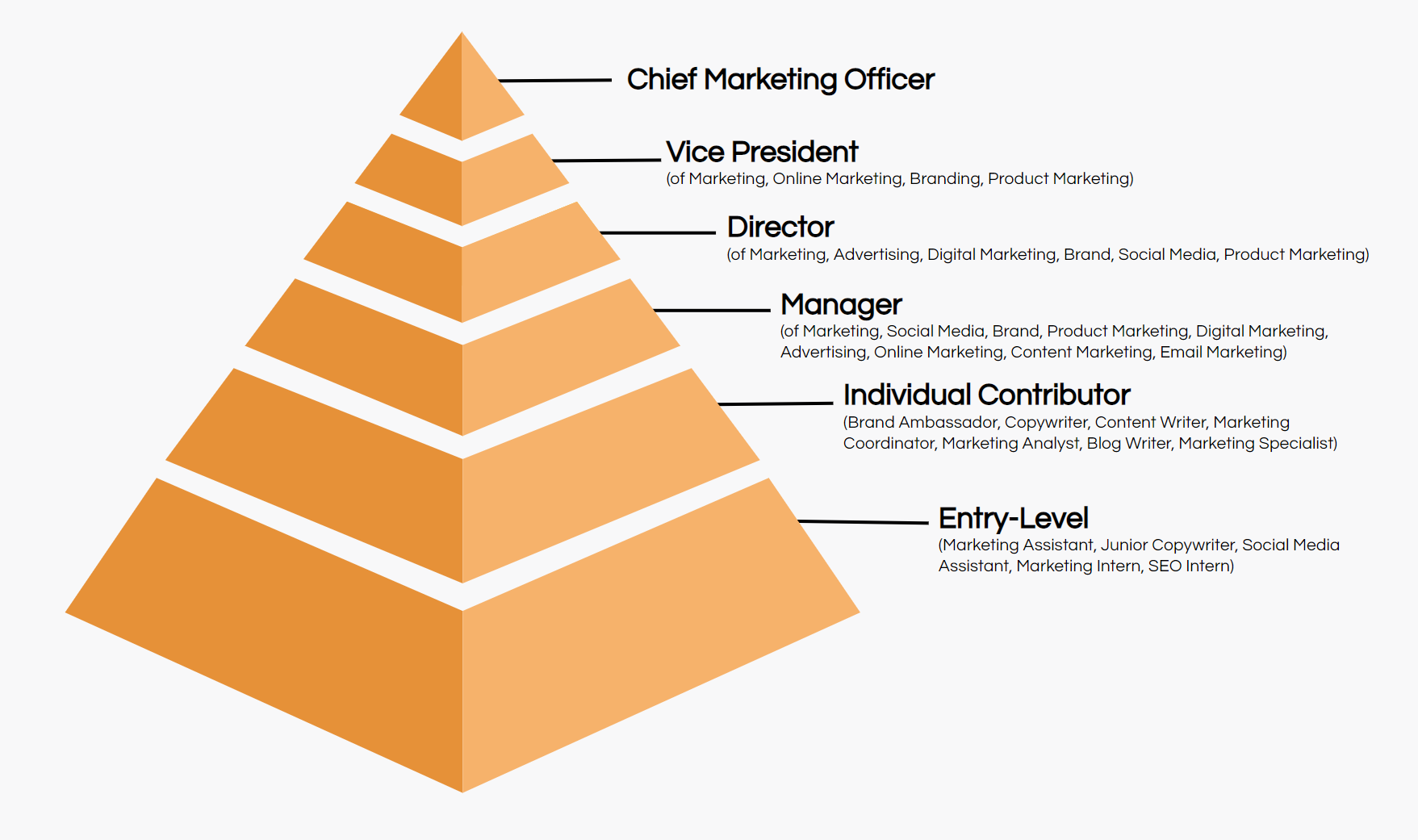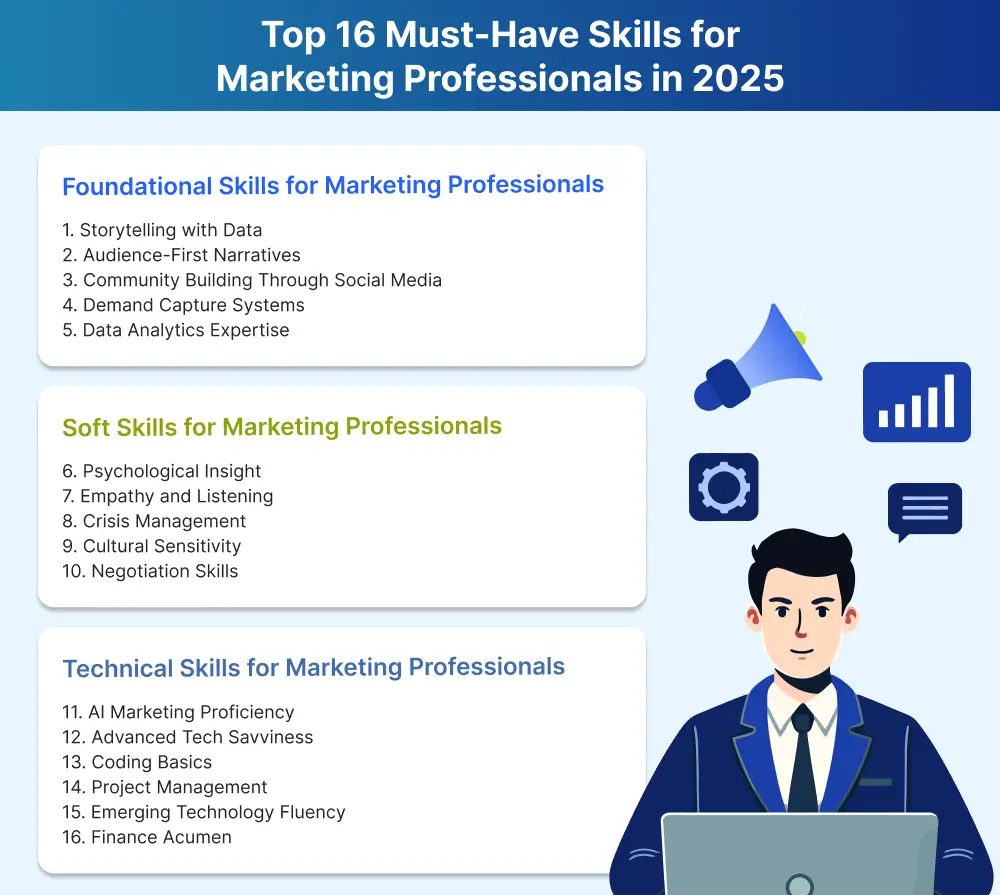- Marketing Professionals: What Advanced Your Career the Most?
- What are the advancement opportunities for a marketing manager?
- What is the career progression in marketing?
- What are 5 career opportunities in marketing?
- What is the highest level of marketing job?
-
Frequently Asked Questions (FAQ)
- What skills have been most impactful in advancing a marketing professional's career?
- How important is networking for career growth in marketing?
- What role does continuous learning play in a marketing professional's career advancement?
- How does specialization impact a marketing professional's career trajectory?
In the ever-evolving world of marketing, professionals are constantly seeking ways to advance their careers and stay ahead of the curve. From mastering new technologies to building strong networks, the path to success is often shaped by a combination of skills, experiences, and strategic decisions. This article explores the key factors that have propelled marketing professionals forward in their careers. By examining insights from industry leaders and successful marketers, we uncover the strategies, tools, and mindsets that have made the most significant impact. Whether you're just starting out or looking to take the next step, these lessons can guide your journey toward professional growth and achievement.
Marketing Professionals: What Advanced Your Career the Most?
1. Continuous Learning and Skill Development
One of the most significant factors that advanced the careers of marketing professionals is continuous learning. The marketing landscape is constantly evolving, with new tools, platforms, and strategies emerging regularly. Professionals who invest time in upskilling and staying updated with the latest trends often find themselves ahead of the curve. This could include taking online courses, attending workshops, or obtaining certifications in areas like digital marketing, data analytics, or content marketing.
See Also What Is the Best Way to Market My Small Business?
What Is the Best Way to Market My Small Business?| Skill | Impact on Career |
|---|---|
| Digital Marketing | Enhances ability to manage online campaigns effectively |
| Data Analytics | Improves decision-making through data-driven insights |
| Content Marketing | Boosts engagement and brand visibility |
2. Building a Strong Professional Network
Networking has proven to be a game-changer for many marketing professionals. Building relationships with peers, mentors, and industry leaders can open doors to new opportunities, collaborations, and insights. Attending industry conferences, joining professional associations, and actively participating in online communities are effective ways to expand your network. A strong network can provide career advice, job referrals, and even partnerships that can significantly advance your career.
| Networking Activity | Benefits |
|---|---|
| Industry Conferences | Access to latest trends and thought leaders |
| Professional Associations | Opportunities for collaboration and mentorship |
| Online Communities | Continuous learning and peer support |
3. Gaining Hands-On Experience
While theoretical knowledge is essential, hands-on experience is what truly sets successful marketing professionals apart. Working on real-world projects, managing campaigns, and experimenting with different strategies provide invaluable insights. Many professionals credit their career advancement to the practical experience they gained through internships, freelance work, or leading projects within their organizations. This experience not only builds confidence but also demonstrates your capabilities to potential employers or clients.
See Also I Just Got a Job as a Marketing Coordinator. I Do Not Know Where to Start.
I Just Got a Job as a Marketing Coordinator. I Do Not Know Where to Start.| Type of Experience | Career Impact |
|---|---|
| Internships | Provides foundational skills and industry exposure |
| Freelance Work | Enhances versatility and client management skills |
| Leading Projects | Demonstrates leadership and strategic thinking |
4. Specializing in a Niche
Specialization can be a powerful way to advance your marketing career. By focusing on a specific niche, such as social media marketing, SEO, or email marketing, professionals can become experts in their chosen field. This expertise often leads to higher demand for their skills, better job opportunities, and the ability to command higher salaries. Specializing also allows marketers to differentiate themselves in a competitive job market.
| Niche | Career Advantages |
|---|---|
| Social Media Marketing | High demand for managing brand presence on platforms |
| SEO | Critical for driving organic traffic and improving rankings |
| Email Marketing | Effective for customer retention and lead nurturing |
5. Leveraging Data and Analytics
In today’s data-driven world, the ability to analyze and interpret data is crucial for marketing professionals. Those who can effectively use data to inform their strategies and measure the success of their campaigns are highly valued. Tools like Google Analytics, CRM software, and marketing automation platforms are essential for tracking performance and making data-backed decisions. Mastery of these tools can significantly enhance a marketer’s career prospects.
See Also For a Small Business, What Does a Marketing Agency Actually Do?
For a Small Business, What Does a Marketing Agency Actually Do?| Tool | Career Benefit |
|---|---|
| Google Analytics | Provides insights into website traffic and user behavior |
| CRM Software | Enhances customer relationship management and sales tracking |
| Marketing Automation | Streamlines campaign management and improves efficiency |
What are the advancement opportunities for a marketing manager?

1. Promotion to Senior Marketing Manager
A Marketing Manager can advance to a Senior Marketing Manager role, which involves overseeing larger teams, managing bigger budgets, and taking on more strategic responsibilities. Key steps for this promotion include:
See Also Marketers, What's Your Side Hustle (or What Would It Be)?
Marketers, What's Your Side Hustle (or What Would It Be)?- Demonstrating consistent success in achieving marketing goals.
- Developing strong leadership and team management skills.
- Gaining expertise in advanced marketing strategies and tools.
2. Transition to Director of Marketing
Another advancement opportunity is moving into a Director of Marketing position. This role focuses on shaping the overall marketing strategy of an organization. To achieve this, a Marketing Manager should:
- Build a track record of successful campaigns and initiatives.
- Develop a deep understanding of the company’s market and competitors.
- Enhance cross-departmental collaboration and communication skills.
3. Specialization in Digital Marketing
Marketing Managers can specialize in Digital Marketing, becoming experts in areas like SEO, social media, or content marketing. This specialization can lead to roles such as Digital Marketing Manager or Head of Digital Marketing. Steps to specialize include:
See Also Over a Year Has Passed Since the Marketing Job Interview...
Over a Year Has Passed Since the Marketing Job Interview...- Gaining certifications in digital marketing tools and platforms.
- Staying updated on the latest digital marketing trends and technologies.
- Leading successful digital campaigns to showcase expertise.
4. Advancement to Vice President of Marketing
For those aiming for executive-level roles, becoming a Vice President of Marketing is a significant advancement. This role involves overseeing the entire marketing department and aligning strategies with business goals. To prepare for this role, a Marketing Manager should:
- Develop a strong understanding of business operations and financial metrics.
- Build a reputation for innovation and strategic thinking.
- Network with industry leaders and gain visibility within the organization.
5. Transition to Chief Marketing Officer (CMO)
The pinnacle of advancement for a Marketing Manager is becoming a Chief Marketing Officer (CMO). This role involves leading the marketing vision for the entire company and reporting directly to the CEO. Key steps to achieve this include:
- Proven success in driving revenue growth through marketing strategies.
- Building a strong personal brand and thought leadership in the industry.
- Mastering the ability to align marketing goals with overall business objectives.
What is the career progression in marketing?

Entry-Level Positions in Marketing
Starting a career in marketing often begins with entry-level roles that provide foundational experience and skills. These positions are crucial for understanding the basics of marketing strategies, consumer behavior, and market research. Common entry-level roles include:
- Marketing Assistant: Supports marketing campaigns, manages schedules, and assists with administrative tasks.
- Social Media Coordinator: Manages social media accounts, creates content, and engages with followers.
- Market Research Analyst: Collects and analyzes data to help companies understand market trends and consumer preferences.
Mid-Level Positions in Marketing
After gaining experience in entry-level roles, professionals often move into mid-level positions that involve more responsibility and strategic decision-making. These roles require a deeper understanding of marketing principles and often involve managing teams or projects. Common mid-level roles include:
- Marketing Manager: Oversees marketing campaigns, manages budgets, and coordinates with other departments.
- Brand Manager: Develops and maintains the brand image, ensuring consistency across all marketing channels.
- Digital Marketing Specialist: Focuses on online marketing strategies, including SEO, PPC, and email marketing.
Senior-Level Positions in Marketing
Senior-level positions in marketing are typically reserved for experienced professionals who have demonstrated success in mid-level roles. These roles involve high-level strategic planning, leadership, and decision-making. Common senior-level roles include:
- Marketing Director: Leads the marketing department, sets overall strategy, and ensures alignment with company goals.
- Chief Marketing Officer (CMO): Oversees all marketing activities, drives brand strategy, and reports to the CEO or board of directors.
- VP of Marketing: Manages multiple marketing teams, develops long-term strategies, and ensures the company's market position.
Specialized Roles in Marketing
Marketing also offers a variety of specialized roles that focus on specific areas of expertise. These roles require advanced skills and knowledge in particular aspects of marketing. Common specialized roles include:
- Content Marketing Manager: Develops and executes content strategies to engage and attract customers.
- SEO Specialist: Optimizes website content to improve search engine rankings and drive organic traffic.
- Product Marketing Manager: Focuses on the marketing strategy for specific products, including positioning and messaging.
Transitioning to Leadership Roles
For those aiming to reach the top of the marketing career ladder, transitioning to leadership roles is essential. These positions require not only marketing expertise but also strong leadership and management skills. Common leadership roles include:
- Head of Marketing: Leads the entire marketing function, often reporting directly to the CMO or CEO.
- Marketing Consultant: Provides expert advice and strategies to companies looking to improve their marketing efforts.
- Entrepreneurial Roles: Some marketing professionals choose to start their own agencies or consultancies, leveraging their expertise to build their own businesses.
What are 5 career opportunities in marketing?

1. Digital Marketing Specialist
A Digital Marketing Specialist focuses on creating and managing online marketing campaigns. This role involves utilizing various digital channels to promote products or services. Key responsibilities include:
- Developing and executing SEO strategies to improve website visibility.
- Managing social media accounts and creating engaging content.
- Analyzing campaign performance using tools like Google Analytics.
2. Brand Manager
A Brand Manager is responsible for maintaining and enhancing a company's brand image. This role involves strategic planning and execution to ensure brand consistency. Key responsibilities include:
- Developing brand strategies to align with business goals.
- Conducting market research to understand consumer behavior.
- Collaborating with design teams to create brand assets.
3. Content Marketing Manager
A Content Marketing Manager oversees the creation and distribution of content to attract and engage a target audience. This role requires a blend of creativity and analytical skills. Key responsibilities include:
- Planning and managing content calendars.
- Writing and editing blog posts, articles, and other content types.
- Measuring content performance and optimizing strategies based on data insights.
4. Market Research Analyst
A Market Research Analyst gathers and analyzes data to help companies understand market trends and consumer preferences. This role is crucial for informed decision-making. Key responsibilities include:
- Designing and conducting surveys and focus groups.
- Analyzing data using statistical software.
- Preparing detailed reports and presenting findings to stakeholders.
5. Public Relations Specialist
A Public Relations Specialist manages the public image of a company or individual. This role involves crafting messages and building relationships with the media. Key responsibilities include:
- Writing and distributing press releases.
- Organizing media events and press conferences.
- Monitoring media coverage and managing crisis communications.
What is the highest level of marketing job?

The highest level of marketing job is typically the Chief Marketing Officer (CMO). This executive role is responsible for overseeing all marketing activities within an organization, including strategy development, brand management, customer engagement, and revenue growth. The CMO works closely with other C-suite executives to align marketing goals with the overall business objectives.
Key Responsibilities of a Chief Marketing Officer (CMO)
The Chief Marketing Officer (CMO) holds a critical position in any organization. Their responsibilities include:
- Developing and executing marketing strategies to drive business growth and brand awareness.
- Managing budgets and allocating resources effectively across various marketing channels.
- Leading cross-functional teams to ensure cohesive messaging and campaign execution.
Skills Required for a Chief Marketing Officer (CMO)
To excel as a Chief Marketing Officer (CMO), one must possess a unique blend of skills, including:
- Strategic thinking to align marketing efforts with long-term business goals.
- Leadership abilities to inspire and guide large teams.
- Data-driven decision-making to optimize campaigns and measure ROI effectively.
Career Path to Becoming a Chief Marketing Officer (CMO)
The journey to becoming a Chief Marketing Officer (CMO) often involves:
- Gaining experience in various marketing roles, such as brand management, digital marketing, or product marketing.
- Building a strong track record of successful campaigns and measurable results.
- Networking and mentorship to learn from industry leaders and gain visibility.
Challenges Faced by a Chief Marketing Officer (CMO)
The role of a Chief Marketing Officer (CMO) comes with its own set of challenges, such as:
- Adapting to rapidly changing technologies and consumer behaviors.
- Balancing short-term results with long-term brand-building efforts.
- Proving the ROI of marketing initiatives to stakeholders and executives.
Impact of a Chief Marketing Officer (CMO) on Business Success
A Chief Marketing Officer (CMO) plays a pivotal role in driving business success by:
- Enhancing brand equity through consistent and impactful messaging.
- Driving customer acquisition and retention through targeted campaigns.
- Innovating marketing strategies to stay ahead of competitors.
Frequently Asked Questions (FAQ)
What skills have been most impactful in advancing a marketing professional's career?
Data analysis and digital marketing expertise are among the most impactful skills for marketing professionals. The ability to interpret data and make data-driven decisions has become essential in modern marketing. Additionally, proficiency in SEO, content marketing, and social media strategy can significantly boost career growth. Professionals who continuously update their skills to align with industry trends, such as AI-driven marketing tools, often see faster career advancement.
How important is networking for career growth in marketing?
Networking plays a crucial role in advancing a marketing career. Building relationships with industry peers, mentors, and leaders can open doors to new opportunities, collaborations, and insights. Attending industry events, participating in online communities, and engaging on platforms like LinkedIn can help professionals stay visible and connected. Many marketing professionals credit their career growth to referrals and recommendations from their network.
What role does continuous learning play in a marketing professional's career advancement?
Continuous learning is vital for staying competitive in the ever-evolving field of marketing. Professionals who invest in certifications, attend workshops, and keep up with the latest trends, such as automation tools and consumer behavior insights, often experience faster career progression. Employers value marketers who demonstrate a commitment to self-improvement and adaptability, which can lead to promotions and leadership roles.
How does specialization impact a marketing professional's career trajectory?
Specializing in a specific area of marketing, such as email marketing, performance marketing, or brand strategy, can significantly enhance career prospects. Specialization allows professionals to develop deep expertise, making them indispensable to their organizations. Additionally, niche skills often command higher salaries and provide opportunities to work on high-impact projects. Many marketing leaders attribute their success to focusing on a particular domain and becoming recognized experts in their field.
Leave a Reply


Articles of interest